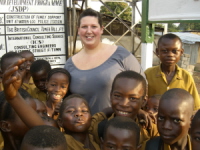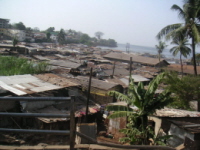
Miss Cain's visit to
Sierra Leone
February 2007

 |
Miss Cain's visit to Sierra Leone February 2007 |
 |
| Clicking any picture on this page will open a larger version in a new browser window. Links to relevant pages and websites are underlined. Please note that we are not responsible for content hosted outside of the Forefield Junior School website. |
About Sierra Leone |
 |
Sierra Leone, meaning 'Lion Mountain', is a country on the West African coast. Ravaged by a long and brutal civil war, it is officially recognised by the UN as the poorest country in the world. |
 |